If you’re wanting to advance your cosmetology expertise, you might be looking to earn a masters in cosmetology.

Cosmetology combines science and art, and a college education can help you develop the necessary skills for a hands-on career in the field of health and beauty. Currently in the US, cosmetology degrees only go up to the associate level. There are alternative degree paths, though, and a variety of professional certifications that can help you grow your skill sets.
Editorial Listing ShortCode:
If you are looking to build a business while still exercising your creative side, this might be the field for you.
Universities Offering Campus or Online Masters in Cosmetic Science Degree Programs
Methodology: The following school list is in alphabetical order. To be included, a college or university must be regionally accredited and offer degree programs campus, online or in a hybrid format.
Fairleigh Dickinson University
Farleigh Dickinson University offers a Master’s in Cosmetic Science. The program aims to help students gain thorough knowledge of cosmetic concepts, procedures, and research methods and develop interpersonal and communication skills.
The program’s classes are taught by practicing professionals in the field of cosmetics. Courses cover topics like product development, health and skin care formulation, and dermal pharmacology.
Fairleigh Dickinson University is accredited by the Middle States Commission on Higher Education.
Fashion Institute of Technology
The Fashion Institute of Technology offers a Master’s in Professional Studies in Cosmetic and Fragrance Marketing and Management. The program aims to provide emerging leaders and innovators in the cosmetics field with the business acumen to excel. Students must complete a minimum of 30 credits to graduate and are permitted to transfer in up to 8 qualifying credits from outside institutions.
The Fashion Institute of Technology is accredited by the Commission on Higher Education of the Middle States Association of Colleges and Schools.
Long Island University
Long Island University offers a Master of Science in Pharmaceutics. The program is designed to provide the fundamental knowledge needed to succeed in the research, development, testing, and manufacturing of products. Students in the program can specialize in Cosmetic Science, where they will learn about the cosmetic and household goods industry.
Long Island University is accredited by the Middle States Commission on Higher Education.
Manhattan College
Manhattan College offers a Master of Science in Cosmetic Engineering. It is designed for those interested in chemical engineering and industrial business processes in the beauty and cosmetic industry. The curriculum covers emulsion and polymer technology, product formulation, industrial regulation, and quality assurance. To graduate, students must also complete a final design project.
Manhattan College is accredited by the Middle States Commission on Higher Education.
University of Cincinnati
The Master of Science in Cosmetic Science at the University of Cincinnati can help prepare students for a variety of roles in the cosmetic industry. The program boasts faculty with extensive experience in the field and academic settings. Classes are housed fully online, though students may opt in for intensives working on formulation in the on-campus lab.
UC is accredited by the Higher Learning Commission.
Online Masters in Cosmetology Programs
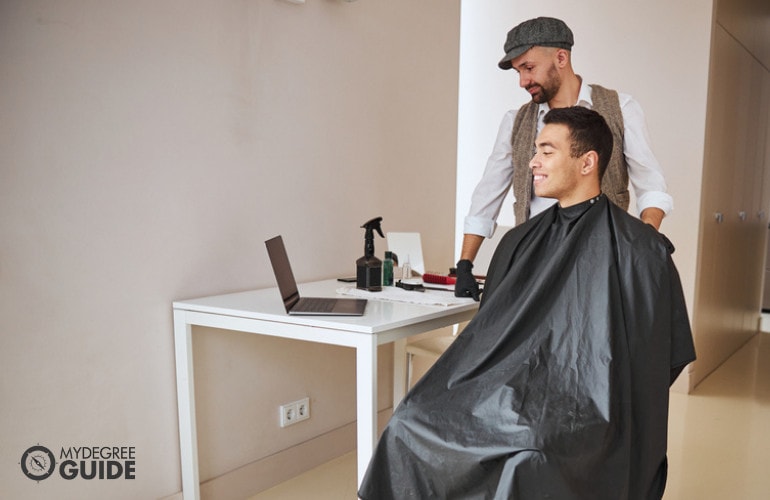
Cosmetologists work directly with clients to provide top quality hair, skin, and nail care. Some practitioners work for spas, hotels, or cruise lines, while others choose to open their own salons.
You can receive a certificate, diploma, or associate’s degree in cosmetology. You can then choose to go on to become a master cosmetologist through specialized study and a licensure exam. While there are avenues to advance your studies in cosmetology, there are currently no available programs to earn your master’s degree in cosmetology in the United States.
There are alternative degree programs available if you want to earn your master’s in the field of beauty. If you’re interested in earning your masters in cosmetic science, a number of schools offer this program online. If you choose to study cosmetology, you can learn in-depth about beauty-specific areas as well as develop a basic understanding of chemistry, anatomy, and physiology. You may study subjects like:
- Hair styling
- Makeup application
- Skin analysis
- Chemistry
- Business management
- Accounting
Earning a basic certificate can qualify you to work for a salon, but advanced training can help you further your career in the field. Through advanced training, you can gain the knowledge and qualifications to earn a license and run your own business. You can also develop specialized skills to go beyond the work of a regular cosmetologist. Some even gain the qualifications to teach others in the field.
In a master cosmetology program, you could continue to study topics you may have covered in your regular cosmetology classes but at a more advanced level. Master cosmetologists sometimes choose to specialize in one specific area, while others continue to practice a wide array of skills.
Online Masters in Cosmetic Science Programs
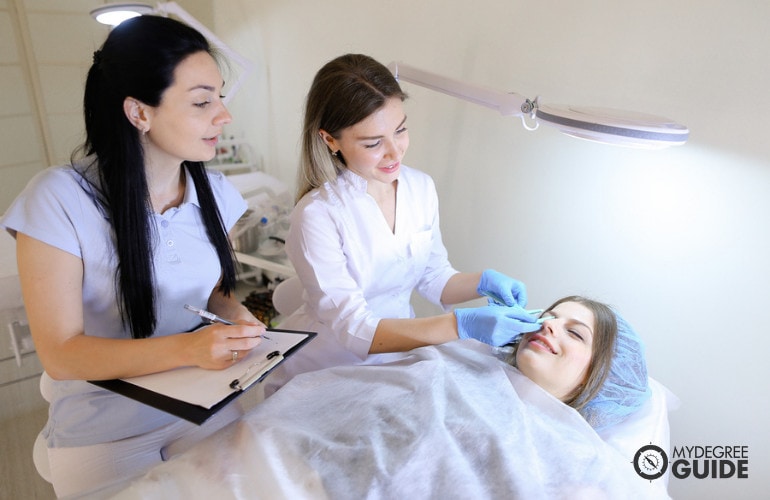
Cosmetic science is a multidisciplinary degree. It combines materials science and chemistry with imaging and modeling to create and market new beauty products.
For students who are interested in cosmetology but would like to earn a master’s degree, a masters in cosmetic science may be a strategic route. When earning a masters degree in cosmetic science, you’ll often take courses on:
- Skin care and hair care science
- Skin, hair, and oral products
- Pharmaceutical sciences
- Ethical research practices
Some electives you may opt for could include:
- Fragrance science
- Color cosmetics
- Clinical and instrumental testing
- Molecular skin biology
- Cosmetic microbiology
Cosmetic science courses offer subject variability and a variety of career opportunities. The following are career fields in the cosmetic science industry that could benefit from a masters in cosmetic science:
- Consumer affairs
- Hair and skincare science
- Fragrance formulation and testing
- Cosmetic chemistry
- Quality assurance
- Marketing
- Product manufacturing and development
This type of degree might open up opportunities with companies that specialize in cosmetics, personal care, chemistry, or pharmaceuticals. Career possibilities range from cosmetic and materials scientist to cosmetology corporate trainer or public relations specialist. You might consider pursuing your master’s in cosmetic science if you are passionate about the realm of health and beauty.
Cosmetology and Cosmetic Science Careers & Salaries
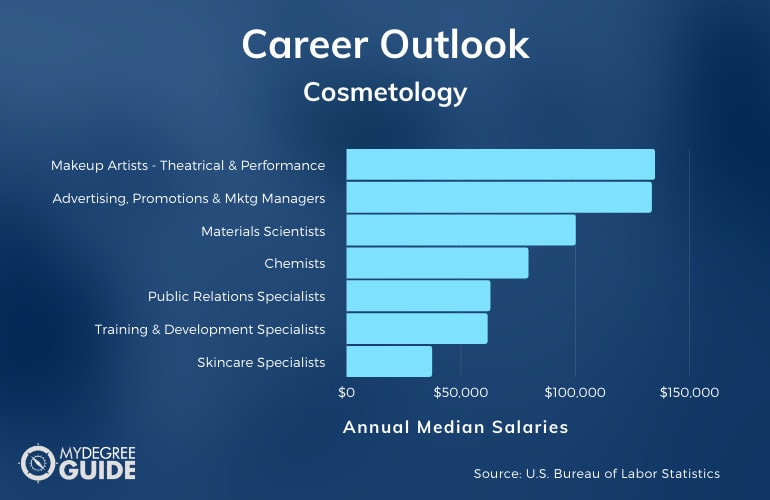
There are a number of career opportunities in the fields of cosmetology and cosmetic science. While both paths offer the chance to work in the beauty industry, cosmetic science leans more on the side of product development and marketing. Cosmetology is more hands-on.
Cosmetologists, barbers, and hairstylists often work for salons and barbershops. These professionals often enjoy the flexibility of setting their own hours and building personal relationships with their regular client base. A degree in cosmetic science is beneficial for students who are looking to learn more about beauty product development. Lipstick, sunscreen, nail polish, body wash, hair dye, and many other personal care products are all available due to the hard work of cosmetic scientists.
Additionally, with a master’s degree, you might be able to build a career in the marketing or corporate management side of the cosmetic industry. According to the Bureau of Labor Statistics, the following are median salaries for career paths related to cosmetology and cosmetic science.
| Careers | Annual Median Salaries |
| Makeup Artists — Theatrical and Performance | $134,750 |
| Advertising, Promotions, and Marketing Managers | $133,380 |
| Materials Scientists | $100,090 |
| Chemists | $79,430 |
| Public Relations Specialists | $62,800 |
| Training and Development Specialists | $61,570 |
| Skincare Specialists | $37,300 |
| Barbers | $29,970 |
| Hairdressers, Hairstylists, and Cosmetologists | $29,670 |
| Manicurists and Pedicurists | $29,210 |
As far as careers go, the more you advance your training, the greater your opportunities will generally be. Becoming a master in cosmetology opens up the door to higher earning potential and more specialized career options.
Since cosmetology covers a wide array of beauty-related topics, you have the benefit of versatility with this degree. You can choose to specialize in one area like skin or nail care, or you can practice many skills at once. Cruise lines, hotels, and spas often hire cosmetologists to pamper their patrons. Alternatively, you could focus on makeup application and aim to become a makeup artist for movies, special events, or theatre performances.
If you are looking to own your own business, a cosmetology degree can help provide you with industry skills as well as a foundation in accounting and business management.
Cosmetology Curriculum & Courses
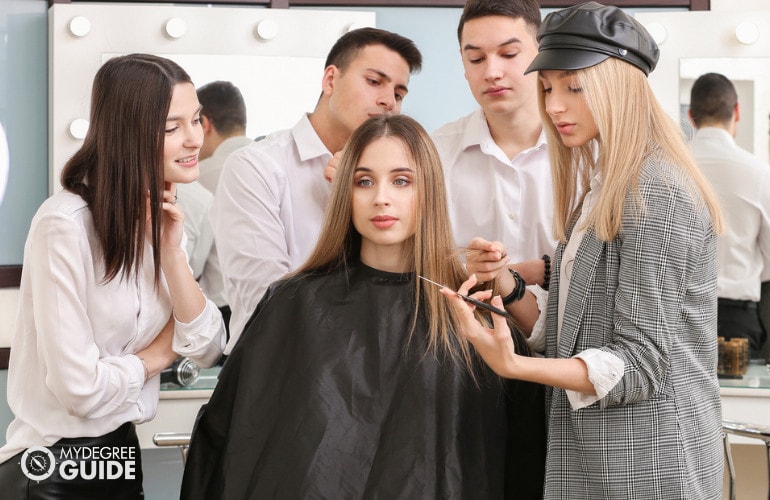
From beauty techniques to business management, pursuing a degree in cosmetology offers you the opportunity to develop a wide range of skills.
Here are some examples of courses that may appear in a cosmetology program:
- Hair Care: This course includes basic tasks like shampooing and hair coloring, but it may also include techniques like styling and cutting, chemical treatments, and scalp massage.
- Aesthetics and Hair Removal: You’ll be introduced to the proper terminology and techniques surrounding waxing, eyebrow arching, make-up application, eyebrow tinting, and skincare.
- Nail Care: Finger and toenail shaping, paraffin dips, and additional manicure and pedicure skills are developed in this class.
- Skin Science: To learn the proper tools and skills for facials and skin analysis, you’ll receive hands-on training in massage techniques, skin conditioning and masks, and electrical facials.
- Salon Management: For students interested in opening their own salon, this course covers the operational basics of running a business.
- Chemical Theory: Understanding chemical interactions and how they affect skin and hair care is an essential skill in the field of cosmetology.
- Personal and Community Health: You’ll learn about the attitudes and practices required to provide beauty and health services to a community.
- Basic Safety and Sanitation: Proper hygiene and workstation maintenance are a must in the field of cosmetology.
- Advanced Hair Design: Along with intricate styling skills and techniques, you’ll also learn about proper wig style and care.
- Principles of Skincare: Beyond providing clients with an in-salon skin treatment, cosmetologists should be able to coach clients in at-home skincare techniques.
Cosmetology coursework is often made up of both lectures and hands-on labs that are taught by licensed industry professionals.
Admissions Requirements

To begin your studies in cosmetology, it’s necessary to first receive a high school diploma or GED equivalent. Once you’ve achieved that step, you can then go on to receive a certificate, diploma, or associate’s degree in cosmetology.
Pursuing advanced qualifications in cosmetology often starts with first acquiring your cosmetology license. You can then go on to complete advanced training, practice your skills hands-on, and take the advanced licensure or certification exam required in your state.
Accreditation

Accreditation is the quality assurance process used to ensure that institutes of higher education meet pre-defined criteria for quality.
Depending on the type of school, regional accreditation is often more highly valued by employers and other institutions. For a college or university to become regionally accredited, it undergoes a review to determine if it upholds set standards of excellence. Your school’s accreditation status may also impact your eligibility for government financial aid and state licensure.
Financial Aid and Scholarships

The cost of a cosmetology degree varies depending on the school and the type of program you choose to attend. Luckily, there are a number of financial aid options to explore. For instance, federal aid and state aid are available to students who qualify.
To apply for federal financial aid for your cosmetology degree, you can submit the Free Application for Federal Student Aid (FAFSA). There are a number of merit-based and need-based scholarships available for cosmetology and other beauty-related programs.
You can apply for scholarships through your institution or privately online. Some employers even have tuition benefits in place for employees who want to further their industry skills.
What Is a Master Cosmetologist?
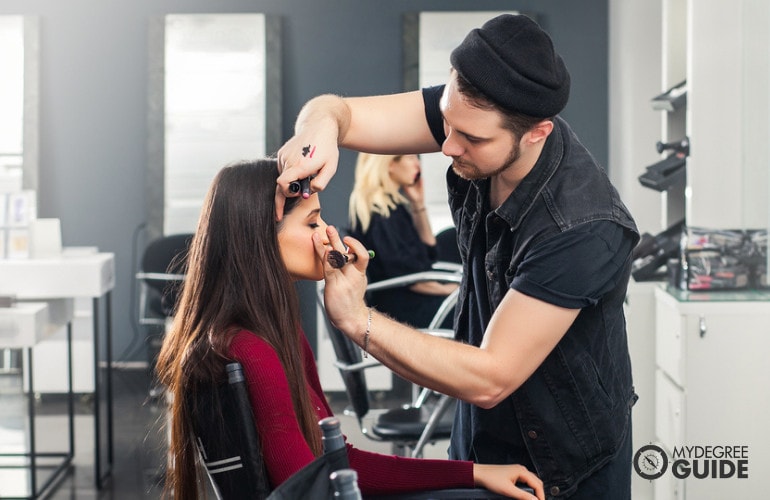
A master cosmetologist is a licensed practitioner who has completed an advanced training program in cosmetology with a specialized focus in one area. They have developed their skills by learning about new products and industry techniques, and they are qualified to take on apprentices.
In order to pursue this title, it’s necessary to complete a state licensing exam and have work experience in the field of cosmetology. Higher salaries and additional career options are generally available to master cosmetologists because of their advanced training and expertise.
How Long Does It Take to Get a Masters Cosmetologist Training?
Once you’ve completed your initial cosmetology coursework, you can move on to the advanced training to become a master of cosmetology. A masters cosmetologist program is typically 5 semesters long and includes a written exam and a hands-on display of skill.
You can also benefit from time spent in the field, either working for a salon or studying as an apprentice under another master cosmetologist. Different states have different requirements when it comes to receiving your license, so it’s strategic to find out what’s expected in the state you wish to practice.
What’s the Difference Between an Esthetician vs. Cosmetologist?
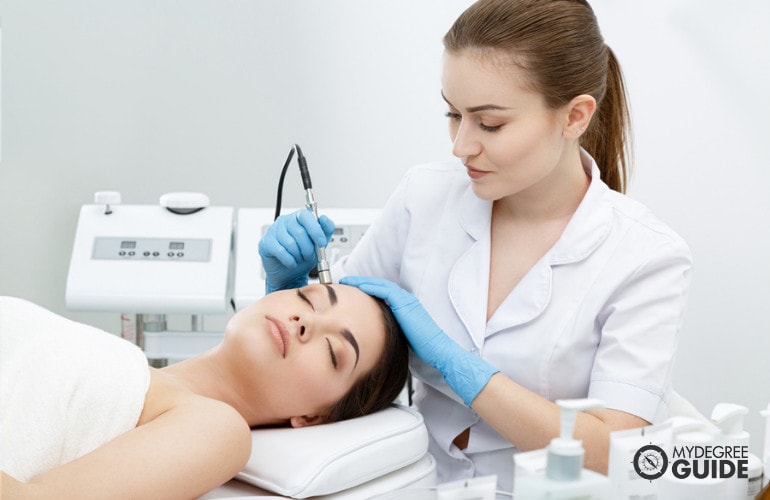
While both cosmetologists and estheticians are focused on helping their clients look and feel their best, cosmetologists have a wider range of expertise in the field of beauty.
Cosmetologists offer treatments in the areas of hair, skin, and nail care, including:
- Haircuts
- Hairstyling
- Facials
- Skin analysis
- Manicures
- Pedicures
- Haircare
Estheticians offer specialty skincare treatments, including:
- Microdermabrasion
- Permanent makeup
- Electrolysis
Some cosmetologists choose to specialize in one area, while others offer multiple services. Estheticians tend to offer several specialized services specifically in the field of skincare.
Getting Your Degree in Cosmetology Online

If you are creative, driven, and passionate about working with clients hands-on, then you might be interested in becoming a master cosmetologist. This career path offers the opportunity to expand your knowledge with in-depth, specialized study.
Earning advanced training in cosmetology may qualify you for a position at a thriving company or give you the push you need toward opening your own salon. Flexibility, growth, and client relationships are all benefits you may encounter along this path.
Advanced training in cosmetology has the potential to help you further your personal and professional goals in this growing field. You can start exploring accredited or state-approved programs today to find the one that’s best for you.
